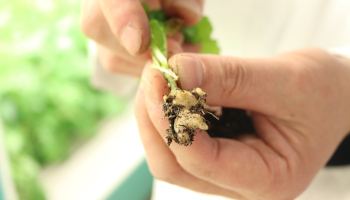Scientists at Saskatoon’s Research and Development Centre have made a 10-year breakthrough in the fight battling clubroot in some of the province’s most popular crops.

The soil-borne disease attacks the roots of plants, making it hard for them to properly transport water, resulting in growth issues in fields like canola.
The disease also attacks vegetable species like cabbage, turnips, and kale.

“It’s a disease that spreads very quickly,” said researcher Fengqun Yu. “From one field to thousands and thousands of fields. It’s a huge stress to canola production. The industry makes $30 billion a year.”
It is widespread across the prairies and western Canada.

Get daily National news
“Our research is very critical in the greenhouse and the lab.”
Fengqun said the crop management methods like sanitation rates and crop rotation schedules have all been used to slow the spread of clubroot.
Her team wants to tackle the problem at its root and grow disease resistant canola by altering genetics.
Vegetable species attacked by clubroot already have some sort of resistance in their genetic makeup. The research team is working through phases to transfer the resistant genes into canola to protect it.
“We are doing the pre-breeding work so we closely work with breeders that are both private and public. So right now, our genetic information including the gene location and genetic markers are delivered to private companies like BASF and Pioneer,” said Fengqun. “We’re doing the work, really wanting to benefit canola production. We really want the grower to receive great benefit from our study.”
The team has already identified more than 20 clubroot resistance genes and are testing it in strains of canola being grown.








Comments